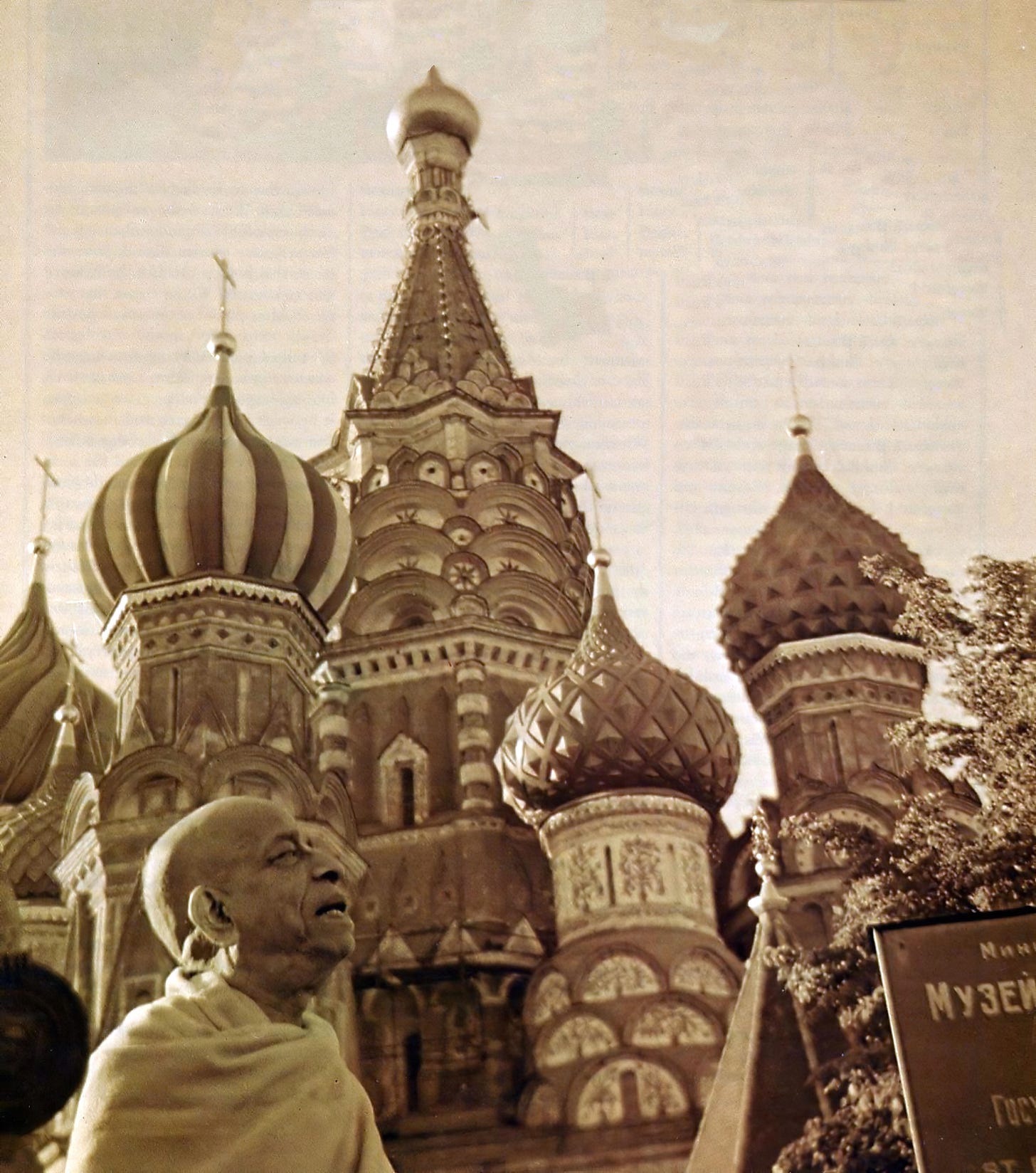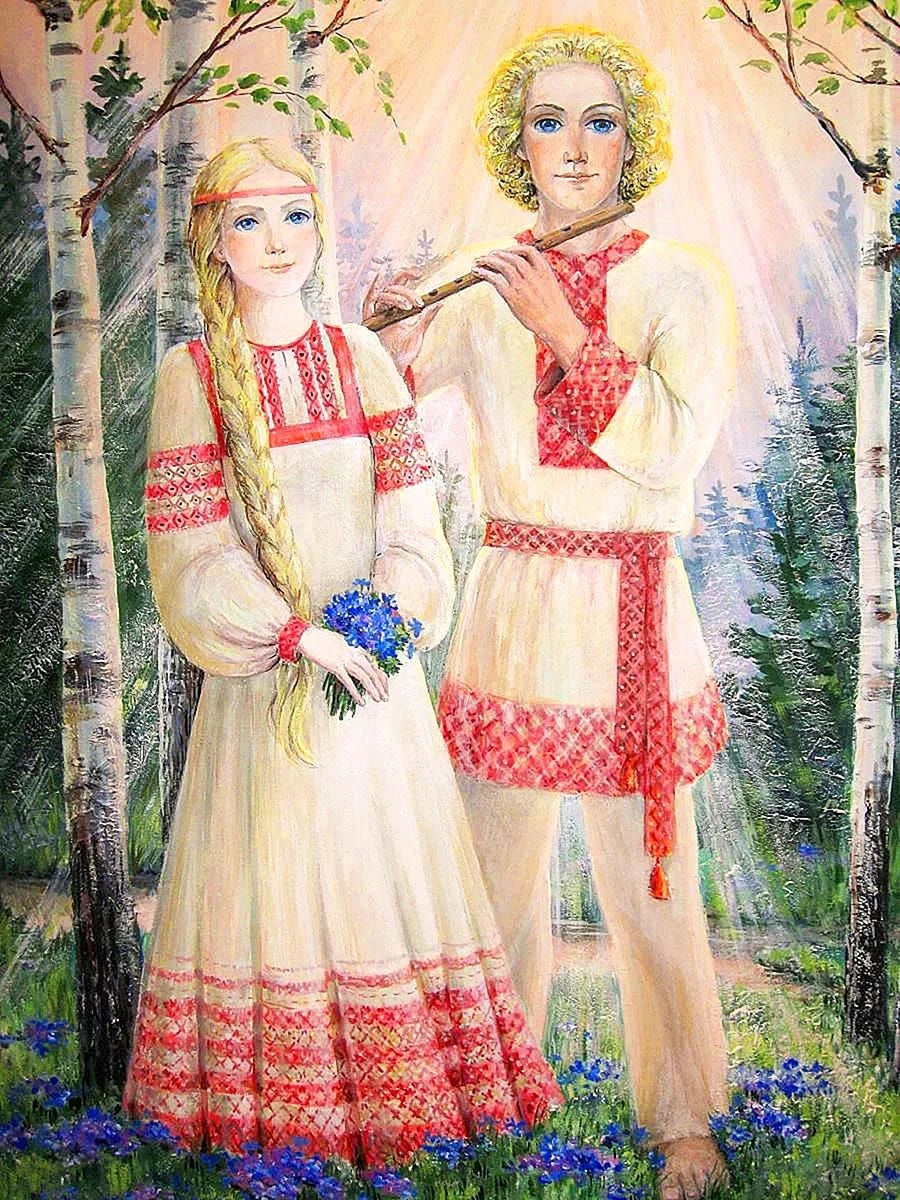The Russian Vedas and how our movement started in the Soviet Union
It may appear hard to believe at first, but people in Russia were followers of the Vedic culture in the past. Even today, this is still prominent, with groups still striving to follow the traditional
It may appear hard to believe at first, but people in Russia were followers of the Vedic culture in the past. Even today, this is still prominent, with groups still striving to follow the traditional culture. There is a great volume of literature on the “Russian Vedas” and a huge cultural inheritance. Even today, the Russian language carries a strong influence from Sanskrit, including huge chunks of the grammar and many words, such as Svoi, Ty, Govorit, Krov, Nebo, Bog, and Agon (just to mention a few), that come, respectively, from the Sanskrit Sva (one’s own), Tvam (thou), Gavati (to speak), Kravya (blood), Nabhas (sky), Bhaga (God), and Agni (fire). Also, in their traditional culture and folklore, we find many stories that are nearly identical to those in the Purāṇas.
Of course, the Russian traditions were preserved mostly orally, as folk tales, so the details became more scattered or altered over time. But the essence remains.
They even have deities known as “Krishen” (or Krishun), the God who plays the flute, and “Radha”, His girlfriend. We can see that Krsna’s name slightly changed in pronunciation over the centuries, but Radha’s name is still intact. They also had various demigods and stories clearly reflecting the Vedic worldview.
How could Vedic culture have come to Russia? In the Purāṇas, we read about Paraśurāma, who wiped out the kṣatriya class 21 times. During this time, many kṣatriyas fled from Bhārata-varṣa to escape his wrath. Some of them came to the north of the Himalayas, eventually settling west of the Ural Mountains.
Over the centuries, especially around the Middle Ages, the influence of Christianity grew stronger. Eventually, Christianity became the state religion, and other traditions were suppressed, but traces of this Vedic heritage still remain. So strong is the Vedic presence in ancient Russia that proponents of the “Arian Invasion” theory even suggest that the Vedas may have originally come from Russia to India. We know this is not correct, but still, this gives an idea of how strong Vedic culture once was in Russia.
We all know that the Russian people endured countless miseries throughout their history. One would struggle to find any “good” period in the Russian story; it’s just one tragedy after another.
Just to start, during most of the medieval period, up to the middle of the 19th century, most of the Russian population were slaves. In the Americas, there were also slaves, but these were imported from other places; in Russia, however, almost all the peasants were “serfs”, basically slaves who had little or no rights. They were tied to the land they worked on and were given just the bare minimum to survive – often not even that. They could be bought and sold, and for a long time, the nobles could even kill their serfs without any consequence.
There were constant raids by the Turks (and before that, the Tatars) that would kill or enslave thousands of people. It may be hard to believe, but during the Middle Ages, the number of European slaves in the Middle East, predominantly from Russia, was roughly equivalent to the number of slaves from Africa.
There were many wars, including the invasion of Napoleon and the First and Second World Wars, that devastated large parts of the country, the communist period, the perestroika, the dissolution of the USSR, and so on, and this is without even mentioning recent events. It’s difficult to find another country where people have suffered so much through the centuries. Even today, even though many are rich in the large cities, most people have very hard lives.
So, the question was exactly why? Why do Russian people have to suffer so much? Is there some kind of curse or collective karma?
Once, I asked a senior Russian devotee, and his answer was quite interesting. Yes, Russia is cursed in a way because people abandoned the original Vedic culture. This actually is the factor that led to the countless miseries the country went upon. We can see a parallel to the history of India, where people also abandoned Vedic culture and went through invasions, massacres, famine, revolutions, and other miseries as a result.
Actually, we know that this is the source of all the miseries in Kali-yuga. Because people abandoned Vedic culture and became sinful, humanity has been enduring wave upon wave of miseries and hardships, and modern civilization has just been increasing that. The solution for both Russia and India, as well as for the rest of the world, is to adopt Krsna Consciousness, which is the quintessence of Vedic culture. Only when people do that will the world again become a place where people can live happily.
Another piece of information in this connection is how the Hare Krsna movement started in Russia, and how the spread of the movement is connected with the events in the country.
Although Russian scholars had been studying the Bhagavad-gīta and other books from the Vedas for centuries, and some even converted to Hinduism, Krsna consciousness in Russia began during the Soviet era, when spreading spiritual ideas was incredibly difficult due to the strict communist regime.
From the very beginning of his mission in the West, Śrīla Prabhupāda had a strong desire to somehow spread Krsna Consciousness in the Soviet Union and China. These were two communist countries that were practically closed off to the outside world, especially to spiritual movements. It seemed almost impossible, but Krsna arranged an opportunity.
Through a connection with Professor Kotovsky, a Soviet scholar, Śrīla Prabhupāda was invited to visit Moscow for five days. This was a very rare and valuable chance. Prabhupāda came along with his disciple Śyāmasundara Prabhu. Because of the restrictions, they were not allowed to bring books, and there were many strict rules to follow. However, accidentally, Śyāmasundara Prabhu had a hardbound Bhagavad-gītā in his bag, which would later play an important role.
Śyāmasundara Prabhu hadn’t even realized that the Bhagavad-gītā was in his luggage. It was only after they were already on the plane to the Soviet Union that he discovered it. He immediately became anxious, thinking, “What if the customs officers find it? Will they arrest us? Confiscate it? Who knows what could happen?”
But Krsna made an arrangement. When they landed and went through customs, the guards were inspecting the luggage carefully, checking what the foreigners were bringing into the country. However, somehow or other, the guards got distracted, and they never checked Śyāmasundara’s bag thoroughly. And so, by Krsna’s divine plan, that Bhagavad-gītā made it into the Soviet Union.
Prabhupāda and Śyāmasundara arrived in Moscow, where they stayed in the famous Intourist Hotel, close to Red Square. From there, they arranged to meet with Professor Kotovsky, a Soviet academic who had invited Prabhupāda for discussions on philosophy. However, things weren’t so simple. Professor Kotovsky’s room was filled with hidden microphones. Every word spoken was being monitored by the government. Because of this, the professor couldn’t speak openly, nor could he agree with what Śrīla Prabhupāda was saying, even if he wanted to.
Years later, Professor Kotovsky gave an interview in which he admitted that he had been deeply impressed by Śrīla Prabhupāda. He said that he recognized the truth in what Prabhupāda was presenting, but at the time, he simply could not openly accept it, because he was expected to represent Communist ideology.
With only three days left in the country, the trip was proving very challenging. One major issue was getting food for Prabhupāda. Even under normal circumstances, the food supply was limited, and in winter it was practically dificult. It was hard even for the regular people, but for a vegetarian, things were especially challenging. Śyāmasundara Prabhu spent most of his time running around the city, taking the long lines to buy products just to get a few basic items to cook something for Śrīla Prabhupāda.
During these errands, Śyāmasundara Prabhu met an intelligent young man who spoke English. The boy asked him, “Are you American?” “Yes,” Śyāmasundara replied. “Do you have any Beatles records?” Śyāmasundara laughed and said, “No, I don’t have records, but I have something better. My spiritual master met the Beatles and even knows them personally. Would you like to come and meet him?”
The boy agreed, and soon after, he was sitting face-to-face with Prabhupāda. As soon as the meeting began, Śrīla Prabhupāda immediately began speaking about the basic principles of Krsna consciousness, explaining the philosophy in a deep yet accessible way. At the end of their meeting, Śrīla Prabhupāda gave the young man the very same Bhagavad-gītā that Śyāmasundara Prabhu had brought into the Soviet Union.
The young man later received initiation from Śrīla Prabhupāda and was given the name Ananta Śānti Dāsa. With no outside support, he began to preach Krsna consciousness inside the Soviet Union. It was a one-man movement, but from his sincerity and Prabhupāda’s mercy, it began to grow. Later on, other devotees, mainly from Europe, began to find ways to enter the USSR. Although it was still extremely dangerous, there were slight openings through Eastern European countries like East Germany, Czechoslovakia, and others. From there, devotees could sometimes secure short-term visas to enter parts of the Soviet Union and go underground to spread Krsna Consciousness.
These devotees risked their lives. The KGB monitored everything, and distributing spiritual literature or speaking about Krsna could lead to arrest, torture, or even death. Many devotees were imprisoned. Some were killed. The repression was severe. Yet despite all this, the movement grew.
Ananta Śānti, along with other courageous devotees, gradually established our movement in Soviet Russia. They spoke secretly held underground programs, and passed around xerox pages of Prabhupāda’s books. Their dedication was unmatched.
Many devotees believe that one of the main reasons the Soviet Union eventually collapsed was due to its sinful treatment of the devotees. As the Bhagavad-gītā teaches, Krsna always protects His devotees. The government had committed horrible atrocities, not only politically, but also spiritually, by oppressing those spreading the Absolute Truth.
After the fall of the USSR, our movement glowed exponentially for some time, until a new wave of repression started after the annexation of Crimea. Again, devotees faced growing repression, which coincided with the current decline of the country. Maybe in the future we will see a new political collapse and a new period of freedom and growth of our movement.
You can also donate using Buy Me a Coffee, PayPal, Wise, Revolut, or bank transfers. There is a separate page with all the links. This helps me enormously to have time to write instead of doing other things to make a living. Thanks!



